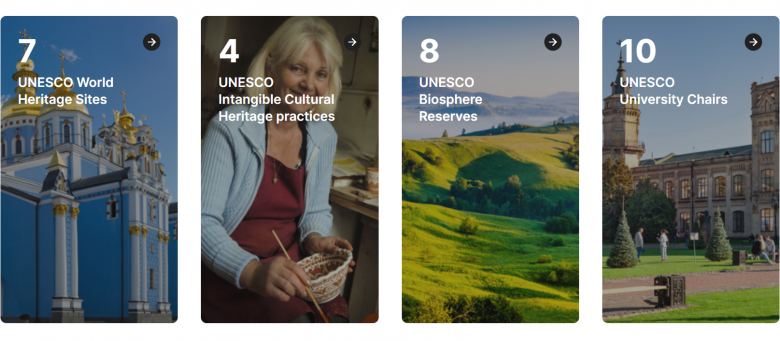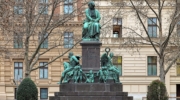Europa Nostra contributes to UNESCO International Coordination Meeting for Emergency Response for Culture in Ukraine
On 17 March, Europa Nostra participated in the International Coordination Meeting for Emergency Response for Culture in Ukraine convened by UNESCO. Many institutions and renowned organisations from the heritage world and beyond – including ALIPH, ICOM, ICOMOS, IUCN, ICCROM, Blue Shield International, the European Commission, Prince Claus Fund, Smithsonian Institution, Europeana Foundation and INTERPOL – gathered to discuss how to promptly and collaboratively act to respond to the emergency and critical situation in Ukraine. Europa Nostra was represented by its Executive President, Prof. Dr. Hermann Parzinger, and Secretary General, Sneška Quaedvlieg-Mihailović.

Credit: UNESCO
This importante meeting was organised with the aim of mapping partner assessments and actions, exploring synergies and creating an international partners’ coordination mechanism for emergency response for culture in Ukraine. This exercise is of utmost importance to identify priority needs and explore synergies for the implementation of urgent actions in the short and medium-term, reinforcing collective actions and avoiding duplication.
The meeting was opened by Assistant Director-General for Culture at the UNESCO World Heritage Centre, Mr Ernesto Ottone, followed by interventions by the Permanent Delegation of Ukraine to UNESCO and by the Ministry of Culture of Ukraine.
After the introductory remarks, H.E. Kateryna Chuyeva, Deputy Minister of Culture and Information Policy of Ukraine gave an overview of damage to culture and heritage in different areas of the country to the meeting participants. Deputy Minister Chuyeva presented several examples of destruction to museums, religious buildings and theatres which have been attacked during the conflict in several Ukrainian cities, and highlighted the need to cooperate with the international community to protect collections as the country is currently lacking special places to evacuate them safely.
Mr. Lazare Eloundou Assomo, Director of World Heritage at UNESCO, provided information regarding the latest updates on UNESCO’s emergency response, which was promptly activated to assist in this crisis situation. UNESCO undertook wide consultations in the past weeks with Ukrainian authorities, site managers of Ukrainian heritage sites, military specialists and organisations active in the field of culture. As part of the emergency measures put in place by UNESCO there is, among others, the creation of an Emergency Expert Group and a dedicated platform to monitor damage, already operational to provide immediate advice, monitor the situation, and collectively respond to practical and operational matters.
The meeting continued with a tour de table of the partner institutions participating in the meeting regarding their first assessments of the priorities identified in the culture sector and the actions they have taken so far to face the emergency situation.
Europa Nostra was represented by its Executive President, Prof. Dr. Hermann Parzinger, and Secretary General, Sneška Quaedvlieg-Mihailović. Board Member Laurent Lévi-Strauss and European Project Officer Sara Zanini joined the meeting as observers.
Our ExPres @hparzinger contributed to the @UNESCO Meeting for #EmergencyResponse for #culture in #Ukraine. He, among others, announced the joint crowd-funding campaign for #culturalheritage in #Ukraine to be launched with @GlobalHeritage later today.#StandWithUkraine️ pic.twitter.com/aBkEU9iPzu
— Europa Nostra (@europanostra) March 17, 2022
In his powerful address, Hermann Parzinger not only mentioned the statement Europa Nostra stands in solidarity with Ukraine published on 25 February, but also informed the participants about the crowdfunding campaigned to support the defenders of Ukraine’s endangered heritage, launched on 18 March, in joint partnership with our valuable partner Global Heritage Fund. He informed the participants that all money raised will be made flexibly available to cover the most pressing needs directly to Ukrainian partners or through our members and partners based in Poland, Romania or other European countries that have mobilised in solidarity with Ukraine and its cultural heritage.
Together with @GlobalHeritage Fund, we just launched a crowdfunding campaign to support the brave defenders of Ukraine’s endangered heritage.
We welcome donations, big or small, and thank you for your generosity & solidarity! #StandWithUkraine
🙌DONATE NOW:https://t.co/f6zj7Bjley pic.twitter.com/0m9KlalRhs— Europa Nostra (@europanostra) March 18, 2022
“As stated by the Board of Europa Nostra at its meeting held on 10 March, the rich and diverse heritage in Ukraine is THE most endangered heritage in the whole of Europe. We therefore need to support heritage defenders in Ukraine,” emphasised our Executive President, who also made reference to our flagship initiative for heritage at risk, the 7 Most Endangered programme run in partnership with the European Investment Bank Institute. In addition, he informed the participants that Europa Nostra sent on 14 March a letter to all Members of the World Heritage Committee to raise its voice against the Chairmanship by the Russian Federation of this year’s session of the World Heritage Committee and that the meeting cannot take place in the World Heritage City of Kazan.
At #UNESCO in Paris, our Board member Laurent Lévi-Strauss & our SG presented to @elounasso Director of #WorldHeritage Centre, copy of our letter addressed to members of #WHCommittee urging them to alter the chairmanship & location of 50th session of this Cttee.#StandWithUkraine pic.twitter.com/Hotb7BX508
— Europa Nostra (@europanostra) March 15, 2022
Lastly, Hermann Parzinger called on European Institutions, insisting that “the European Union, which has already agreed on massive support to Ukraine on many different fronts, should also include cultural heritage needs among the priority areas of its humanitarian aid/emergency support to Ukraine”.
During the interventions of the different partners present at the meeting, several important initiatives were mentioned. Among others, ALIPH – The International alliance for the protection of heritage in conflict areas (with which Europa Nostra signed a Memorandum of Understanding in January 2022), which allocated an initial envelope of USD 2 million to protect Ukraine’s cultural heritage and support its heritage professionals.
Interventions were made by ICOM, ICOMOS, IUCN, and ICCROM – just to mention a few. In particular, the latter is collaborating with the Prince Claus Fund and the Smithsonian Institution – also present at the meeting – to translate their handbook and toolkit on First Aid to Cultural Heritage in Times of Crisis into the Ukrainian language.
The Blue Shield International is also trying to coordinate activities among their network, they organised a shipment of supplies to the country and they are working to remind the Russian Federation of their obligations under international law.
Catherine Magnant, Head of Unit at the Directorate-General for Education, Youth, Sport and Culture (EAC) of the European Commission provided an overview regarding the aid the European Union is providing in Ukraine, especially via the EU Civil Protection Mechanism for assistance. The European Union stands ready to support cultural heritage directly, both in the short and medium term, and also indirectly via the networks supported by the Creative Europe Programme, among which is Europa Nostra.
Many organisations mentioned increasing concerns about the damage to heritage facilities and their collections and equipment. They shared the difficulties they have encountered in undertaking interventions given the impossibility to assess the situation on the ground, but they are nevertheless trying to monitor the situation thanks to the help provided by digital techniques, such as monitoring via drones.
The Europeana Foundation, for instance, is concentrating their efforts towards the digitisation of cultural heritage and supporting international volunteer initiatives like Sucho.org. On another side, INTERPOL is mobilising their network to monitor the situation regarding the illicit trafficking of cultural goods, and they are working on an app to proceed with the official inventory of objects of art in a quicker way.
It is in this difficult situation that Europa Nostra asks all European and international institutions to continue to join forces and voices to provide necessary support to heritage professionals, managers and custodians in Ukraine. We welcome and praise the initiative taken by UNESCO and its ambition to act as the coordinator of international efforts of solidarity and support for the cultural and cultural heritage sectors in Ukraine.






